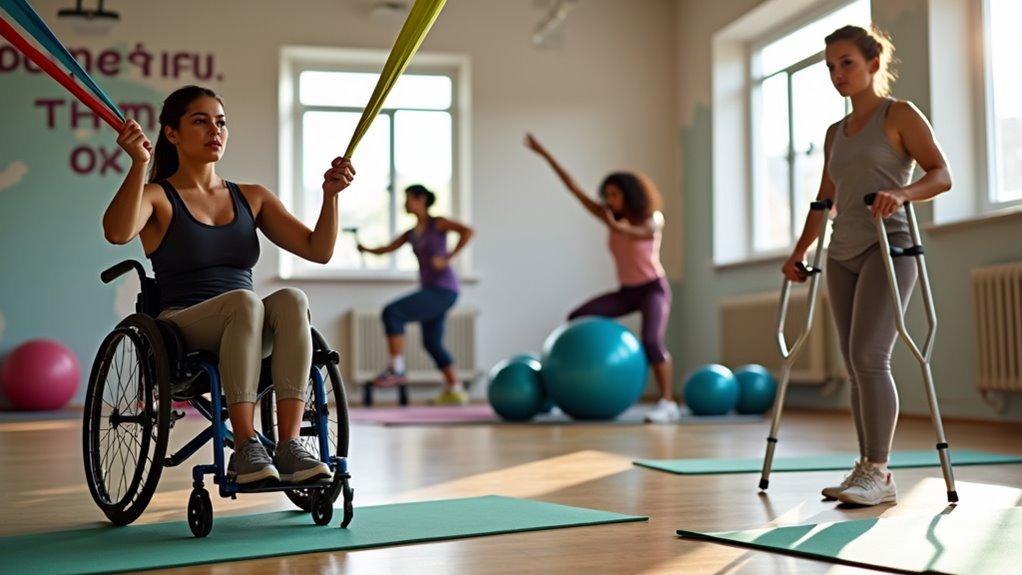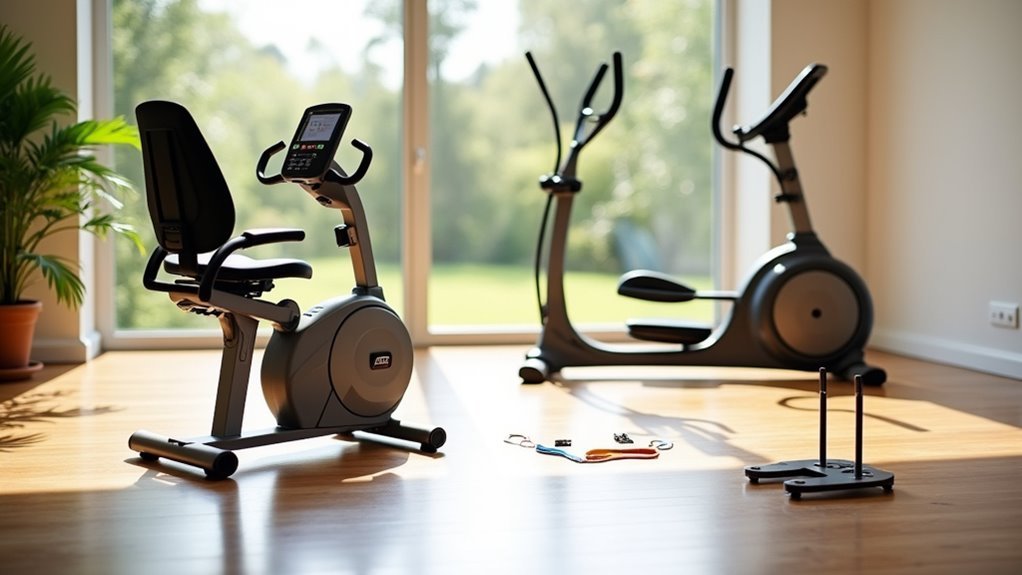For senior athletes, dairy products like yogurt (449mg calcium per cup) and milk (300mg per cup) provide essential calcium for muscle recovery. Don’t overlook calcium-rich fish—sardines deliver 180mg per serving while canned salmon offers 250mg with bones. Leafy greens such as kale (250mg per cup) and spinach (120mg per cup) are excellent plant-based options. Spreading your calcium intake throughout the day enhances absorption and supports your athletic performance. Discover how these sources can strengthen your training regimen.
Dairy Products: Calcium Powerhouses for Athletic Performance

Powerhouses of nutrition, dairy products stand as the gold standard for calcium intake among senior athletes. Plain yogurt leads the pack with 449mg per cup, providing 45% of your daily calcium needs, while cow’s milk delivers about 300mg per cup.
As you train, your body relies on dairy’s calcium for proper muscle function and recovery. The phosphorus in these foods works synergistically with calcium to maintain bone health—crucial for preventing fractures as you age. This calcium intake is especially important as many seniors approach the recommended 1000 mg daily for adults.
For maximum benefit, aim for three dairy servings daily. Add Greek yogurt to your post-workout routine for muscle-building protein, sprinkle cheddar on sandwiches, or enjoy ricotta as a protein-rich snack.
These versatile options eliminate the need for supplements while supporting your athletic performance.
Calcium-Rich Fish and Green Vegetables for Active Seniors
Beyond dairy products, senior athletes can significantly boost their calcium intake through fish with edible bones and nutrient-dense green vegetables. Canned sardines provide approximately 180mg of calcium per 3-ounce serving, while canned salmon offers about 250mg per 3 ounces with bones.
You’ll find substantial calcium in leafy greens too—cooked kale delivers around 250mg per cup, while spinach contains 120mg.
These foods offer benefits beyond calcium: fish supplies high-quality protein and anti-inflammatory omega-3s essential for muscle repair, while green vegetables contribute antioxidants that combat exercise-induced oxidative stress. For optimal health benefits, aim to spread calcium intake throughout the day rather than consuming it all at once.
Incorporate these calcium powerhouses by adding sardines to pasta dishes, blending greens into smoothies, or including broccoli in stir-fries.
These strategic additions support bone density, help prevent osteoporosis, and enhance your overall athletic performance.
Fortified Foods and Plant-Based Calcium Solutions for Bone Strength

For senior athletes who limit dairy or follow plant-based diets, fortified foods and plant alternatives provide excellent calcium sources to maintain bone strength.
Fortified plant milks deliver approximately 300mg of calcium per 8oz serving, comparable to dairy milk. Calcium-enriched cereals, orange juice, and breakfast foods can considerably boost your daily intake.
Don’t overlook natural plant sources like tofu (205mg per 4oz), black beans (240mg per cup), and lentils (198mg per cup).
Tahini and dried figs offer smaller but valuable contributions to your calcium needs.
These options help you address lactose intolerance while maintaining dietary variety.
Try incorporating fortified plant milk with breakfast cereals or blending tofu into post-workout smoothies to reach your 1,300mg daily target through diverse, enjoyable foods. Distributing calcium intake throughout the day helps maximize absorption and utilization by the body.
Frequently Asked Questions
How Does Calcium Timing Affect Athletic Recovery After Intense Workouts?
Consuming calcium before and during exercise helps you recover faster by reducing PTH spikes and bone resorption markers. You’ll maintain better calcium homeostasis, which supports muscle function and decreases recovery time after intense workouts.
Can Calcium Supplements Replace Food Sources for Senior Athletes?
No, calcium supplements can’t fully replace food sources. You’ll benefit more from dairy, leafy greens, and fortified foods that provide co-factors enhancing absorption. Supplements should complement your diet rather than replace it.
How Do Medications Interact With Calcium Absorption in Older Athletes?
Medications like calcium channel blockers, corticosteroids, and antiseizure drugs can impair your calcium absorption. You’ll need to time your supplements carefully and possibly choose calcium citrate if you’re taking acid reducers.
What Are Signs of Calcium Deficiency Specific to Senior Athletes?
As a senior athlete, you’ll notice specific calcium deficiency signs like muscle cramps, reduced coordination, slower recovery after workouts, tingling in extremities, brittle nails, and increased risk of bone injuries during activity.
How Does Caffeine Consumption Affect Calcium Retention in Aging Bodies?
Caffeine increases your urinary calcium excretion, potentially doubling calcium loss at high doses. As you age, this effect is more concerning, especially if you’re consuming over 300mg daily with inadequate calcium intake.
In Summary
You’ve now got three powerful calcium sources to fuel your athletic performance as you age. Whether you’re enjoying dairy products, calcium-rich fish with leafy greens, or fortified foods, you’ll strengthen your bones and support muscle function. Don’t wait until it’s too late—incorporate these options into your daily nutrition plan and you’ll maintain the skeletal strength you need for an active, competitive lifestyle.





Leave a Reply